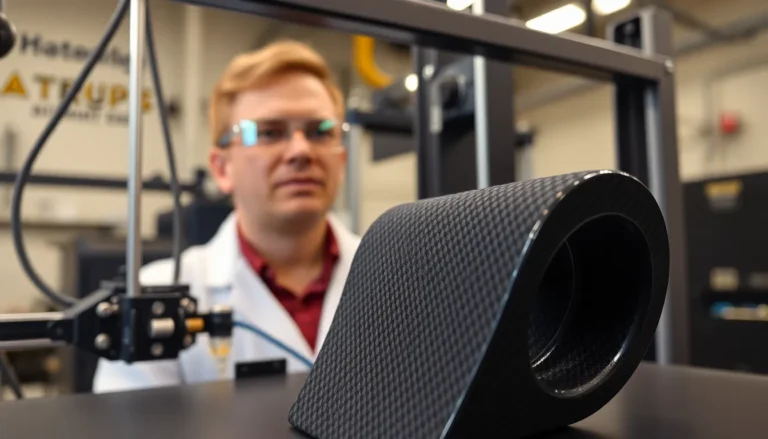Table of Contents
ToggleIn a world increasingly powered by gadgets and gizmos, the quest for sustainable battery technology has never been more urgent—or more exciting. Imagine a future where your smartphone charges faster than you can say “low battery,” all while being eco-friendly. Sounds like a dream, right? Well, it’s closer than you think!
As the demand for energy storage skyrockets, innovators are racing to develop batteries that not only last longer but also tread lightly on the planet. From plant-based materials to cutting-edge recycling techniques, sustainable battery technology is revolutionizing how we power our lives. So, buckle up and get ready to explore the electrifying advancements that promise to keep our devices running without draining Mother Earth.
Overview Of Sustainable Battery Technology
Sustainable battery technology addresses the environmental challenges posed by traditional battery systems. Innovations in material science lead to the development of alternatives to lithium-ion batteries. Research focuses on plant-based components that reduce reliance on scarce resources. These advancements aim to lower carbon footprints while enhancing energy storage capabilities.
Battery recycling techniques gain momentum as a critical component of sustainability. Methods such as closed-loop recycling recover valuable materials, minimizing waste and preserving resources. Additionally, manufacturers adopt modular battery designs to simplify repairs and upgrades. This shift supports longevity, directly impacting electronic waste reduction.
Numerous companies invest in developing solid-state batteries. These batteries promise improved safety and efficiency compared to conventional options. Charging times may decrease significantly, enhancing user experience and convenience. Integrating this advanced technology into electric vehicles offers further environmental benefits.
Emerging technologies like flow batteries and sodium-ion batteries present alternative solutions. Flow batteries provide scalable energy storage, making them suitable for grid applications. Sodium-ion batteries leverage abundant materials, alleviating supply concerns associated with lithium.
Sustainability goals drive collaboration among researchers, manufacturers, and policymakers. Partnerships foster innovation and expedite the adoption of greener practices in battery production. Enhanced regulations also encourage the development of eco-friendly technologies.
Continued investment in research and development propels sustainable battery technology forward. Initiatives focusing on efficiency, recyclability, and ethical sourcing strengthen industry standards. These efforts pave the way for a more sustainable future in energy storage, benefiting both consumers and the environment.
Types Of Sustainable Battery Technologies

Sustainable battery technologies encompass various innovations that promise eco-friendly energy solutions. Several advancements in materials and designs emphasize efficiency, safety, and reduced environmental impact.
Lithium-Ion Alternatives
Lithium-ion alternatives present exciting opportunities for reducing reliance on scarce resources. Sodium-ion batteries leverage abundant sodium, offering a lower-cost solution while addressing supply chain concerns. Researchers explore organic batteries made from plant-derived materials, promoting sustainability and minimal environmental degradation. These alternatives aim to provide similar performance levels without the ecological drawbacks associated with conventional batteries.
Solid-State Batteries
Solid-state batteries stand out for their enhanced safety and efficiency. Unlike traditional lithium-ion batteries, solid-state designs use solid electrolytes, minimizing risks such as leakage and combustion. This technology allows for faster charging times and greater energy density, enabling longer-lasting power sources. Companies increasingly invest in solid-state innovations, recognizing their potential to revolutionize energy storage while contributing to sustainability objectives.
Environmental Impact Of Battery Production
Battery production significantly impacts the environment, particularly concerning resource extraction and waste management. Understanding these effects is crucial for developing sustainable practices.
Resource Extraction Concerns
Resource extraction for battery materials raises several environmental issues. Mining operations for lithium and cobalt lead to habitat destruction and water pollution. Extraction processes consume vast energy resources, contributing to greenhouse gas emissions. Furthermore, the reliance on limited resources complicates sustainability efforts. Companies are increasingly exploring alternatives, such as abundant sodium or plant-based materials, to mitigate these concerns. Innovators focus on sustainable mining practices and enhanced recycling to lessen reliance on newly mined resources. Emphasizing ethical sourcing can benefit ecosystems and communities affected by mining activities.
Waste Management Solutions
Waste management poses a significant challenge for battery technology. Disposing of traditional batteries contributes to environmental pollution and resource loss. Implementing advanced recycling techniques, such as closed-loop systems, allows for the recovery of valuable materials from spent batteries. Various companies are developing programs to encourage battery collection and recycling, enhancing overall sustainability. Prioritizing modular designs in batteries promotes longer usage and easier recycling. Some initiatives focus on upcycling materials from obsolete batteries to create new products, reducing waste. By addressing these waste management challenges, the battery industry can move toward a more circular economy.
Innovations In Sustainable Battery Technology
Sustainable battery technology continues to advance through innovative research and development. Various exciting methodologies are emerging in this field.
Recycling Methods
Advanced recycling techniques are transforming the battery lifecycle by minimizing e-waste and enhancing resource efficiency. Closed-loop recycling systems allow companies to reclaim valuable materials, such as lithium and cobalt, from used batteries. Innovations in hydrometallurgy and pyrometallurgy are improving extraction processes, leading to higher recovery rates. On-site recycling facilities are being developed, reducing transportation emissions while boosting local economies. These methods not only support sustainability goals but also reduce dependency on new mining operations, thereby lessening environmental impacts.
Energy Efficiency Improvements
Energy efficiency is a critical focus in sustainable battery technology. Solid-state batteries illustrate significant advancements, offering enhanced performance, safety, and faster charging times. Manufacturers are deploying nanomaterials to improve ion conductivity and optimize battery interfaces. Flow batteries are making strides in scalable energy storage, providing efficient solutions for renewable energy integration. Sodium-ion batteries provide a promising alternative by utilizing readily available materials, effectively reducing costs and supply concerns. These improvements help propel sustainable energy solutions, fostering a greener future while addressing the growing global energy demands.
Future Trends In Battery Sustainability
Innovations in battery technology continue to shape a sustainable future. Solid-state batteries stand out, offering enhanced safety and efficiency through solid electrolytes. Companies are increasingly prioritizing these advancements, resulting in shorter charging times and a lower environmental impact.
Investment in sodium-ion batteries is gaining traction, utilizing abundant materials to address supply chain concerns. These batteries alleviate the pressure on scarce resources while providing a viable alternative to traditional lithium-ion systems. Flow batteries are another promising technology, specifically designed for scalable energy storage and grid applications.
Modular battery designs enhance longevity, making battery systems more recyclable and less wasteful. Manufacturers are focusing on creating batteries that can be easily disassembled, improving resource recovery during recycling processes. Closed-loop recycling systems reclaim valuable materials from used batteries, reducing the need for raw material extraction.
Collaboration among researchers and industry players accelerates sustainable practices. Enhanced partnerships lead to innovative solutions that prioritize ethical sourcing and responsible production. Advanced recycling techniques, such as hydrometallurgy and pyrometallurgy, are improving material recovery rates, further supporting eco-friendly objectives.
Emerging energy technologies strive for efficiency in every aspect. Energy efficiency remains crucial as the global demand for sustainable solutions grows. Advancements in nanomaterials enhance ion conductivity in various battery types, supporting renewable energy integration.
A focus on plant-based materials is evident in the latest research, promoting environmental conservation. These initiatives aim to minimize the ecological impact associated with traditional battery production. Continuous development drives sustainability within the battery industry, paving the way for a greener future in energy storage.
The future of energy storage hinges on sustainable battery technology. As innovations continue to emerge companies are prioritizing eco-friendly materials and advanced recycling techniques. This commitment not only addresses environmental concerns but also enhances efficiency and safety.
Collaboration among researchers manufacturers and policymakers is essential for driving these advancements. By focusing on ethical sourcing and reducing waste the industry can pave the way for a cleaner energy future. As sustainable battery solutions gain traction they promise to meet the growing demand for energy while safeguarding the planet for generations to come.




